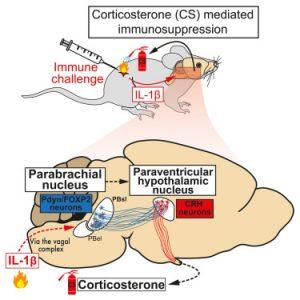Exciting new research has shed light on how our brains adapt our behaviour in response to infections or injuries (Figure 1). The study has revealed the existence of a circuit within the brain that not only senses inflammation in the blood but also regulates the anti-inflammatory response across different brain regions. This discovery points to a fascinating two-way connection between the brain and the immune system.
When infections or injuries occur, the immune system springs into action, working to control the infection and repair damaged tissue. During this process, pro-inflammatory mediators are released, which communicate the body’s immune status to the brain and coordinate the immune response.
The researchers in this study identified a novel circuit through which the brain gauges inflammation levels in the blood and subsequently regulates inflammation. This circuit involves a brainstem region called the vagal complex, which directly detects inflammatory hormones in the bloodstream.
Using cutting-edge neuroscience techniques, the scientists were able to pinpoint the specific neurons involved during inflammation. They observed that the activity of certain neurons in the parabrachial nucleus could regulate the production of white blood cells critical for the immune response. This remarkable research showcases how neural activity in the brain alone can significantly influence the development of immune responses during infections or injuries.
This newly discovered neuro-immune communication highlights how the brain’s predictive abilities can benefit the immune system by anticipating potential threats in our environment. These findings open exciting possibilities for future research and potential therapeutic approaches aimed at harnessing the brain’s influence on immune responses for improved health outcomes. Understanding the intricate interplay between the brain and immune system could pave the way for innovative interventions to combat infections and promote healing after injuries.
Journal article: Ferdinand, J., et al. 2023. The parabrachial nucleus elicits a vigorous corticosterone feedback response to the pro-inflammatory cytokine IL-1β. Neuron.
Summary by Stefan Botha











